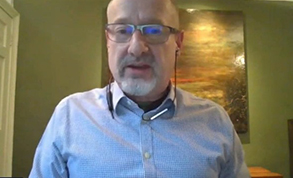HFMA 2020: digital transformation about much more than technology
HEE director of innovation and transformation Patrick Mitchell told the HFMA annual conference that adoption of technology across the NHS was about far more than IT and robotics. ‘People talk about digital. They think about apps. They think about the technology. But 80% of what we are talking about is about change,’ he said. ‘It’s about hearts and minds and its around bringing people with us. And the digital becomes the catalyst for that change.’
Mr Mitchell worked alongside Eric Topol to undertake the Topol review, which led to the publication of Preparing the healthcare workforce to deliver the digital future in 2019. The report aimed to think through what skills people would need in the future – and when – to deliver a service where the patient was at the centre of healthcare facilitated by technology. In what disciplines would the NHS need more or even fewer staff? And what additional skillsets would different clinicians need?
While the review mapped out a timeline for when these skillsets would be needed by the bulk of staff for different technologies such as telemedicine, smartphone apps and wearable diagnostic devices, Mr Mitchell said that Covid had already changed this.
The rapid adoption of virtual consultations both in primary care and outpatients had shown the progress that could be made if the public and the NHS were bought into the idea.
Technology will primarily benefit patients, making services more timely and more convenient. But there will also be productivity improvements. Mr Mitchell gave a number of examples around virtual fracture clinics, the use of teleconsultations in care homes and the use of speech recognition in accident and emergency departments.
All of these are being done in some parts of the NHS and, although he accepted there were limitations with over-simplified calculations, scaling-up across the NHS could produce significant savings.
In the case of speech recognition, with major developments in the technology in recent years, South Tees Hospital NHS Foundation Trust had saved three minutes per patient for doctors filling in clinical documentation. Even using a conservative estimate for savings of just one minute, scaling up this technology across the service could free up 400,000 hours of A&E consultation time in a year, equivalent to 230 A&E doctors’ time.
Apply the same approach to outpatient clinics and you free up the equivalent of 600 doctors to spend more time on clinical care. And the potential is even greater for GP consultations.
Mr Mitchell said it was clear that the service would need more bioinformaticians – people with IT and AI skills as well as statistics and biosciences knowledge. HEE has already commissioned training for such specialists. However, he said that such people would be in huge demand across the NHS, academia and industry and an agreement would be needed to ensure all sectors could work together to meet the needs of patients.
However all staff would need some form of digital skillset and curricula for clinicians would need to change.
However leadership would be the foundation for transformation. ‘We have to make sure boards understand their responsibility for this and making sure this happens,’ he said. ‘We also need a workforce that understands what this is about and what it is not about and understands the language. People understand digital from a social perspective and an education perspective – we all have apps and we all buy on line. But when it comes to our workplace in healthcare, that is not always quite understood.’
A number of HEE supported education and development programmes are already underway, including a blended learning degree that will deliver new ‘digital nurses’. And a self-assessment tool is due to be released soon to help staff understand their own level of digital literacy.
Mr Mitchell finished by stressing that different staff not only had different levels of digital literacy but also needed different skill sets to take their jobs into the future. A one-size fits all training solution would not be appropriate.
A digital learning solutions team was now working with most NHS trusts to support digital literacy skills for different staff. ‘What a staff nurse will need on a ward is going to be very different from what a neurosurgeon needs, who could be using the latest AI technology. So we’ve got to get the balance right,’ he said.
Related content
We are excited to bring you a fun packed Eastern Branch Conference in 2025 over three days.
This event is for those that will benefit from an overview of costing in the NHS or those new to costing and will cover why we cost and the processes.